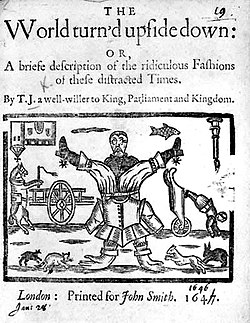
"The World Turned Upside Down" is an English ballad. It was first published on a broadside in the middle of the 1640s as a protest against the policies of Parliament relating to the celebration of Christmas. [1]
Contents
Parliament believed the holiday should be a solemn occasion, and outlawed traditional English Christmas celebrations, which were seen as too closely associated with Catholicism. [2] There are several versions of the lyrics. It is sung to the tune of another ballad, "When the king enjoys his own again". [3]
Its origin is in the Scripture: "But the other Jews which believed not, moved with envy, took unto them certain lewd fellows of the baser sort, and gathered a company, and set all the city on an uproar, and assaulted the house of Jason, and sought to bring them out to the people. (6) And when they found them not, they drew Jason and certain brethren unto the rulers of the city, crying, 'These that have turned the world upside down are come hither also; Whom Jason hath received: and these all do contrary to the decrees of Caesar, saying that there is another king, one Jesus'." Acts 17:5–7